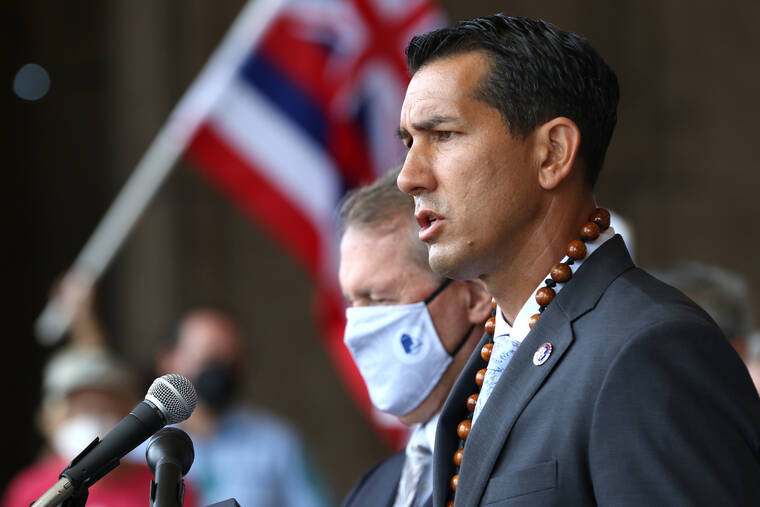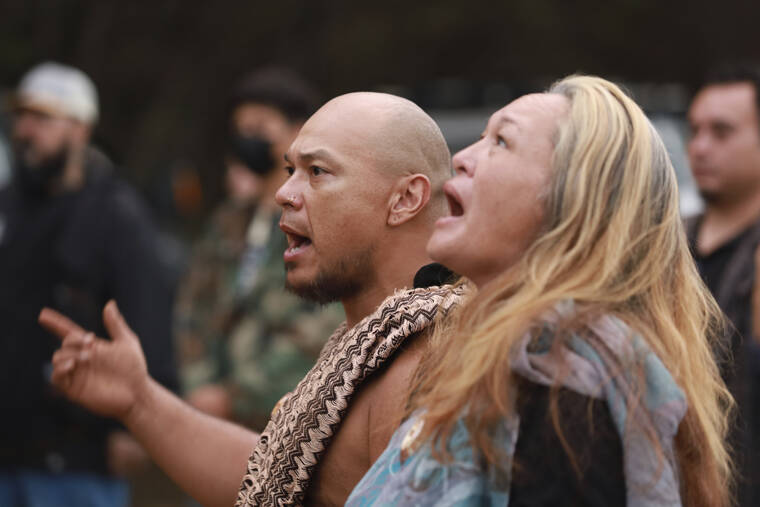Fuel in water deepens Native Hawaiians’ distrust of military

U.S. Rep. Kaiali'i Kahele speaks at a rally at the Hawaii state capitol over water contamination by the U.S. Navy near Pearl Harbor on Feb. 11 in Honolulu. Native Hawaiians who revere water in all its forms as the embodiment of a Hawaiian god say the Navy's acknowledgement that jet fuel leaked into Pearl Harbor's tap water has deepened the distrust they feel toward the U.S. military. (AP Photo/Caleb Jones)

A group of demonstrators wave signs at the Hawaii state capitol during a rally over water contamination by the U.S. Navy near Pearl Harbor on Feb. 11, 2022 in Honolulu. Native Hawaiians who revere water in all its forms as the embodiment of a Hawaiian god say the Navy's acknowledgement that jet fuel leaked into Pearl Harbor's tap water has deepened the distrust they feel toward the U.S. military. (AP Photo/Caleb Jones)

In this photo provided by Bradford Nakamura, Makaio Villanueva, left, and Gina Peterson chant about the importance of water during a traditional Hawaiian ceremony on December 12, 2021, in Honolulu. Protesters who erected the shrine at the gates of the headquarters of the commander of the U.S. Pacific Fleet oppose the U.S. Navy's use of a giant fuel storage tank facility because jet fuel leaked into a drinking water well. (Bradford Nakamura via AP)
HONOLULU — A well-known adage in Hawaiian, ola i ka wai, means “water is life.”
HONOLULU — A well-known adage in Hawaiian, ola i ka wai, means “water is life.”
Native Hawaiians revere water in all its forms as the embodiment of one of the Hawaiian pantheon’s four principal gods.
The resource is so valuable that to have it in abundance means prosperity. The Hawaiian word for water — wai — is repeated in the word for wealth — waiwai.
So when the Navy confirmed petroleum from one of its fuel tank facilities had leaked into Pearl Harbor’s tap water, many Native Hawaiians were not just concerned, they were hurt and offended.
“This has been the most egregious assault on a public trust resource in the history of Hawaii,” said Kamanamaikalani Beamer, a former trustee of the Commission on Water Resource Management.
Nearly 6,000 people, mostly those living in military housing at or near Joint Base Pearl Harbor-Hickam, got sick after petroleum-laced water came pouring out of their taps late last year. Residents worry fresh water for broader Oahu also is in danger because the aging tank system sits above an aquifer that provides drinking water to most of the island and has a history of leaks.
The Navy is working to address the problem. But many say it has deepened a distrust in the military that dates to at least 1893, when a group of American businessmen, with support from U.S. Marines, overthrew the Hawaiian kingdom. More recently, Native Hawaiians fought to stop target practice bombing on the island of Kahoolawe and at Makua Valley in west Oahu.
“The military has a long history of poor stewardship of Hawaii’s natural and cultural resources,” Carmen Hulu Lindsey, chair of the board of trustees of the Office of Hawaiian Affairs, said in an email in response to questions. “Time after time the people of Hawaii have been left to clean up after the military ravages our sacred lands — from unexploded ordnance and toxic waste to the loss of cultural and historic sites and endangered species — without even appropriating resources to finance these efforts.”
For some, the water contamination was the last straw.
The crisis has “shattered people’s trust in the military,” said Kawena‘ulaokala Kapahua, a Native Hawaiian political science doctoral student and one of the activists pushing to shut down the tank facility.
“I think this is really pushing people to the edge because we all need water to live,” Kapahua said. “And I think it’s a very scary thought for people that their children or their grandchildren may never be able to drink the water that comes out of the tap.”
Navy officials seemed aware of the distrust when they testified to members of Congress in January.
“I understand the deep connection that the people of Hawaii, particularly the Native Hawaiian community, have with the lands and waters of Hawaii,” Rear Adm. Blake Converse, deputy commander of the U.S. Pacific Fleet, said while noting he lived in Hawaii off and on for more than eight years.
Rear Adm. John Korka, commander of Naval Facilities Engineering Systems Command, also noted his connection to the islands, sharing which church he worshipped in and the Catholic school his children attended while living in Hawaii. “This is a personal issue for me, and I’m sorry.”
Using 2019 Census data, the Office of Hawaiian Affairs estimates that 3,439 Native Hawaiians across the United States serve in the armed forces, which is 0.8% of the total Native Hawaiian adult population in the U.S.
Many see value in the state’s relationship with the military, which also provides civilian jobs that are considered desirable alternatives to service work in the tourism industry.
Native Hawaiian Vietnam War veteran Shad Kane said he is troubled by the contaminated water, but it hasn’t tested his faith in the military. His trusty pickup truck bears special Hawaii license plates indicating he’s a combat veteran. He plans to transfer the plates to his new Toyota Tacoma.
“Yes, I’m bothered by that, but I also know the Navy has a greater responsibility,” Kane said. “The Navy wants to do the right thing.”
The Navy hasn’t determined how petroleum got in the water. Officials are investigating a theory that jet fuel spilled from a ruptured pipe last May and somehow entered a fire suppression system drain pipe. They suspect fuel then leaked from the second pipe Nov. 20, sending it into the drinking water well.
The Navy has been trying to clear petroleum from the contaminated well and pump it out of the aquifer. Officials are also flushing clean water through the Navy’s water system — which serves 93,000 people in military homes and offices in and around Pearl Harbor. In the meantime, the Navy put up affected military families in Waikiki hotels.
Beamer, the former water commission trustee, had been calling for the decommissioning of the tanks since 2014, when more than 27,000 gallons of fuel leaked from one of tanks.
The Navy “promised us nothing like this would possibly happen,” he recalled. “They would never risk the lives of their own. … They drink out of the same aquifer.”
After initially resisting, the Navy said in January it would comply with Hawaii’s order to remove fuel from the tank facility, which is used to power many U.S. military ships and planes that patrol the Pacific Ocean. But in February, the Navy lodged an appeal in court.
Rear Adm. Tim Kott, commander of Navy Region Hawaii, said in a statement this week that Navy officials will continue to work with, listen to and learn from the Native Hawaiian community.
“We know we have a lot of work ahead of us to gain the trust of the communities across the island, and in particular Native Hawaiians,” he said. “We will continue to work tirelessly to restore community trust and the safe drinking water of our families and neighbors.”
U.S. Rep. Kaiali’i Kahele, a combat pilot who serves as an officer in the Hawaii National Guard, has invoked the Hawaiian word hewa, which can mean sinful or wrong, to describe the Navy water contamination. He has also called it “crisis of astronomical proportions.”
He traces his Native Hawaiian family’s roots to a small fishing village near the southern tip of Hawaii’s Big Island where there’s no running water and residents rely on catching rain.
Elders instilled in him that every drop is precious.
“All life originated through having healthy, fresh water,” Kahele said.
Associated Press writer Audrey McAvoy contributed to this report.


